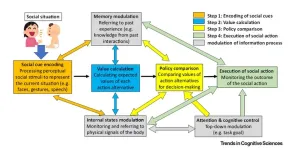(Press-News.org) WASHINGTON — Discrimination experienced by Black people can affect their health and increase their frailty, which can be particularly impactful for cancer survivors, according to a new study by researchers at Georgetown University’s Lombardi Comprehensive Cancer Center and colleagues at the Barbara Ann Karmanos Cancer Institute in Detroit. The researchers assessed frailty by a number of factors, including whether a participant had several chronic diseases, poor muscle strength and difficulty performing activities of daily living.
The findings appeared March 20, 2023, in Cancer.
“Discrimination can act as a chronic stressor which can throw the body off balance, resulting in increases in blood pressure, heart rate, metabolism, inflammation, and numerous other factors. These stressors can also increase rates of aging, leading to greater risk of frailty,” says the study’s lead investigator, Jeanne Mandelblatt, MD, MPH, director of the Georgetown Lombardi Institute for Cancer and Aging Research. “We hypothesize that discrimination can lead to an older biological age than a person’s actual chronological age. This is important to understand as there have been virtually no studies of the relationships between discrimination and aging in the setting of cancer survivorship.”
The investigators looked at associations between discrimination and frailty among 2,232 Black breast, lung, prostate and colorectal cancer survivors who were within five years of their diagnoses and were no longer actively being treated for their cancers. Survivors were 62 years of age on average (with ages ranging from 23 to 84) at the time of the study, but they may have experienced discrimination over many decades of their lives. All participants were part of the Detroit Research on Cancer Survivors (ROCS), which is the largest U.S. study of Black cancer survivors.
The researchers surveyed the participants, via phone, in writing, or online about any aging-related diseases they had, their ability to maintain a healthy lifestyle, and most importantly, about major discrimination events they may have experienced over their lifetimes, specifically targeting seven areas:
● being unfairly fired or denied a promotion in their job;
● not being hired for a job;
● being unfairly stopped, searched, questioned, physically threatened or abused by police officers;
● being unfairly discouraged by a teacher or advisor from continuing their education;
● unfairly receiving worse medical care than other people;
● being prevented from moving into a neighborhood because a landlord or realtor refused to sell or rent them a house or an apartment; and/or
● moved into a neighborhood where neighbors made life difficult.
Based on the survey results, the majority of cancer survivors were classified as either prefrail (42.7%), meaning they had some health difficulties, or frail (32.9%). Only 24.4% of those surveyed had few or no signs of frailty. When queried about the seven discrimination areas, 63.2% of the participants reported experiencing major discrimination, with an average respondent reporting 2.4 types of discrimination.
“For those cancer survivors who reported four to seven types of discrimination events, we observed a large, clinically meaningful increase in frailty scores compared to survivors with fewer discrimination events,” explains Mandelblatt, also a professor of oncology and medicine at the Georgetown University School of Medicine. “Significantly, this pattern of discrimination affecting frailty was consistent across the four types of cancer surveyed, indicating that discrimination is an important factor to study and understand in Black cancer survivors in order to improve their quality and length of life.”
“Our results indicate that after considering the effects of traditional factors on poor health, such as income, education and types of cancer treatment, discrimination was a significant factor explaining frailty and it acted independently of the other variables,” says Ann Schwartz, PhD, MPH, co-lead author on the paper and co-principal investigator of the Detroit ROCS. “Regardless of whether you were rich or poor, if you experienced more discrimination then you had greater frailty.” Schwartz is also professor and associate chair of oncology at Wayne State University School of Medicine, and deputy center director and executive vice president for research and academic affairs at Karmanos.
For their next steps, the researchers are hoping to study the relationships between major discrimination, other chronic life stressors and markers of biological aging and test how cancer and its treatment further contributes to biological aging among racial and ethnic minorities.
“We have long since recognized the impact of discrimination on health and well-being in Black communities,” says study co-author Lucile Adams-Campbell, PhD, a professor of oncology and associate director for Minority Health and Health Disparities Research at Georgetown Lombardi. “We hope that this study leads to more discussions between providers and their patients about the types of discrimination they have experienced and gives providers a greater understanding of how discrimination impacts frailty.”
###
Additional authors include Xingtao Zhou and Traci Bethea at Georgetown Lombardi; Julie Ruterbusch, Hayley Thompson and Kristen Purrington at Wayne State University School of Medicine and Karmanos Cancer Institute.
The authors report having no personal financial interests related to the study.
This research was supported by National Cancer Institute grants U01 CA199240, R01CA129769, R35CA197289 and K01CA212056 and a National Institute on Aging grant R21AG07500. This work was supported by the Epidemiology Research Core and the National Cancer Institute Center Grant (P30CA022453) awarded to the Karmanos Cancer Institute at Wayne State University.
About Georgetown University’s Lombardi Comprehensive Cancer Center
Georgetown’s Lombardi Comprehensive Cancer Center is designated by the National Cancer Institute (NCI) as a comprehensive cancer center. A part of Georgetown University Medical Center, Georgetown Lombardi is the only comprehensive cancer center in the Washington D.C. area. It serves as the research engine for MedStar Health, Georgetown University’s clinical partner. Georgetown Lombardi is also an NCI recognized consortium with John Theurer Cancer Center/Hackensack Meridian Health in Bergen County, New Jersey. The consortium reflects an integrated cancer research enterprise with scientists and physician-researchers from both locations. Georgetown Lombardi seeks to improve the diagnosis, treatment, and prevention of cancer through innovative basic, translational and clinical research, patient care, community education and outreach to service communities throughout the Washington region, while its consortium member John Theurer Cancer Center/Hackensack Meridian Health serves communities in northern New Jersey. Georgetown Lombardi is a member of the NCI Community Oncology Research Program (UG1CA239758). Georgetown Lombardi is supported in part by a National Cancer Institute Cancer Center Support Grant (P30CA051008). Connect with Georgetown Lombardi on Facebook (Facebook.com/GeorgetownLombardi) and Twitter (@LombardiCancer).
END
Study finds relationship between discrimination and frailty in Black cancer survivors
2023-03-20
ELSE PRESS RELEASES FROM THIS DATE:
Underactive immune response may explain obesity link to COVID-19 severity
2023-03-20
Individuals who are obese may be more susceptible to severe COVID-19 because of a poorer inflammatory immune response, say Cambridge scientists.
Scientists at the Cambridge Institute of Therapeutic Immunology and Infectious Disease (CITIID) and Wellcome Sanger Institute showed that following SARS-CoV-2 infection, cells in the lining of the lungs, nasal cells, and immune cells in the blood show a blunted inflammatory response in obese patients, producing suboptimal levels of molecules needed to fight ...
Unrealistic vaping views? Nearly ½ of parents confident they’d know if their child vapes
2023-03-20
Nearly half of parents say they would definitely know if their child was vaping, despite characteristics of vaping devices that make it easy to hide or disguise their use, a new national poll suggests.
Four in five parents also think their adolescent or teen understands the health risks of vaping with few believing their child has tried it, according to the C.S. Mott Children’s Hospital National Poll on Children’s Health at University of Michigan Health.
“Very few parents believe their ...
Changing one’s behavior in different social interactions is child's play
2023-03-20
Society and social interaction play a key role in life for humans. The well-being of a person greatly depends upon their ability to be part of complex socio-cultural institutions. Even during infancy, humans rely on their social interactions with other humans for social and cultural learning, subsequent adaptation to different social environments, and ultimately, survival. Several studies have shown that infants do not respond automatically or reflexively to external cues, but instead adaptively modulate their social behaviors to suit their social context. Gaze-following is one such behavior that infants modulate based on their surroundings. ...
Financial landlords own four times more rental units than previously thought
2023-03-20
New research indicates that a small percentage of financial landlords, like private equity firms and institutional investors, own four times more of Montreal’s rental housing stock than was previously estimated. Neighbourhoods with more financial landlords are also experiencing higher housing stress levels.
In the first comprehensive analysis of its kind in a North American city, researchers from the University of Waterloo and McGill University developed a new method of identifying networks of property ownership lurking behind ...
Multi-drug resistant organisms can be transmitted between healthy dogs and cats and their hospitalised owners
2023-03-19
**Note: the release below is a special early release from the European Congress of Clinical Microbiology & Infectious Diseases (ECCMID 2023, Copenhagen, 15-18 April). Please credit the conference if you use this story**
Embargo: 2301H UK time Saturday 18 March
Healthy dogs and cats could be passing on multidrug-resistant organisms (MDROs; bacteria that resist treatment with more than one antibiotic) to their hospitalised owners, and likewise humans could be transmitting these dangerous microbes to their pets, according to new research being presented ...
New immunotherapy strategies in targeting complexity in the tumor microenvironment
2023-03-18
Alexandria, VA – A symposium aiming to provide a better understanding of the tumor microenvironment, immune tolerogenic niches at cancer initiation, and novel immunotherapeutic strategies in head and neck cancer patients was featured at the 52nd Annual Meeting & Exhibition of the AADOCR, held in conjunction with the 47th Annual Meeting of the CADR. The AADOCR/CADR Annual Meeting & Exhibition took place at the Oregon Convention Center in Portland on March 15-18, 2023.
Cancer ...
Towards a greater degree of diversity, equity, and inclusion in the oral health space
2023-03-18
Alexandria, VA – In alignment with AADOCR’s Diversity and Inclusion Statement, several symposia exploring the ongoing challenges in addressing the oral health care needs of equity-deserving populations were featured at the 52nd Annual Meeting & Exhibition of the AADOCR, held in conjunction with the 47th Annual Meeting of the CADR. The AADOCR/CADR Annual Meeting & Exhibition took place at the Oregon Convention Center in Portland on March 15-18, 2023.
The symposium, “Assessing Oral Health ...
Study outlines the development of a novel adhesive patch capable of treating oral lichen planus and recurrent aphthous stomatitis
2023-03-18
Alexandria, VA – A study exploring the development of “Dental Tough Adhesive (DenTAI)”, a novel bioinspired adhesive patch with robust mechanical properties, capable of strong adhesion, and able to carry out extended release of clobetasol-17-propionate, the first-line drug for treating oral lichen planus (OLP) and recurrent aphthous stomatitis (RAS) was presented at the 52nd Annual Meeting & Exhibition of the AADOCR, held in conjunction with the 47th Annual ...
Towards a better understanding of the structural and functional properties of salivary mucins
2023-03-18
Alexandria, VA – A symposium exploring the significance, interactions, and evolutionary mechanisms of salivary mucins was featured at the 52nd Annual Meeting & Exhibition of the AADOCR, held in conjunction with the 47th Annual Meeting of the CADR. The AADOCR/CADR Annual Meeting & Exhibition took place at the Oregon Convention Center in Portland on March 15-18, 2023.
Mucin proteins in saliva are responsible for the unique physicochemical properties of saliva that include lubrication, viscosity, and barrier function. A dense array of O-glycans attached to the mucin protein backbone provide mucins with their typical functions.
Recently, ...
Can ChatGPT be counted on?
2023-03-18
A study in the Journal of The National Cancer Institute Cancer Spectrum looked at chatbots and artificial intelligence (AI), as they become popular resources for cancer information. They found these resources give accurate information when asked about common cancer myths and misconceptions. In the first study of its kind, Skyler Johnson, MD, physician-scientist at Huntsman Cancer Institute and assistant professor in the department of radiation oncology at the University of Utah (the U), evaluated the reliability and accuracy of ChatGPT’s ...


